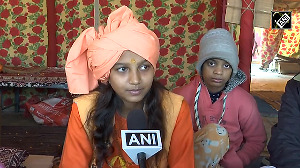'India will succeed. I know this past year has caused a lot of concern, but this year is over and by elections we will achieve our ambitious economic agenda.'
Aziz Haniffa on P Chidambaram's encounter with the who's who of American business in Washington, DC.
Finance Minister P Chidambaram met with investors in Washington, DC, on Wednesday at a private interaction hosted by the US-India Business Council as part of his week-long North America investor 'road show,' aimed at attracting foreign direct investment at a time when the country needs it most, even as the US Chamber of Commerce launched a scathing attack on India for undermining intellectual property rights and its professed commitment to innovation.
Chidambaram seeking massive doses of FDI to bridge the massive current account deficit that India currently holds was hosted by the USIBC to an off-the-record luncheon meeting that convened top global industry leaders to discuss with the finance minister the opportunities that exist in India and to candidly address some of the challenges companies face in the market which affects investor sentiment.
The USIBC said in a statement that 'topics of conversation included infrastructure, retail, agriculture, life sciences, financial services, legal services, and real estate.'
'Global industry wants India to succeed,' Chidambaram said. 'India will succeed. I know this past year has caused a lot of concern, but this year is over and by elections we will achieve our ambitious economic agenda.'
USIBC Chairman Ajay Banga, president & CEO, MasterCard, said, 'We commend Minister Chidambaram for his leadership during these complex times. The American business community continues to look to India as a partner in the global economy ripe with investment opportunities.'
The intimate gathering reflected combined assets of more than $2 trillion, the USIBC said, and noted that participants included former USIBC Board chairpersons, Indra Nooyi, CEO, PepsiCo Inc; Frank Wisner, foreign affairs advisor, Patton Boggs, and former US ambassador to India; Charles 'Chip' Kaye, co-president, Warburg Pincus; and Harold McGraw III, chairman, president, and CEO, The McGraw Hill Companies.
Also in attendance were Lloyd Blankfein, CEO, Goldman Sachs; Jay Fishman, CEO, The Travelers Companies; Doug DeVos, president, Amway; Olivier Brandicourt, president, emerging markets, Pfizer; John Hele, CFO, MetLife; Jacques Tapiero, president, emerging markets, Eli Lily; Peter Kellogg, CFO, Merck; and Henri Courpron, CEO, ILFC, among others.
Coincident with Chidambaram's arrival, Mark Elliot, executive vice president of the Global Intellectual Property Centre at the US Chamber of Commerce, highlighted the detrimental impact of the Government of India's decision to deny a medical patent that has been granted in nearly 40 other countries.
In a piece entitled 'Global Patients to Lose if IP Rights Uncertain,' Elliot emphasised the pattern of judgments and decisions in India that clearly undermine intellectual property rules, and call into question the country's commitment to promoting and fostering future innovation.
Coming close on the heels of America Inc's concern over India's Preferential Manufacturing Access policy, Elliot said in a statement made available by the Chamber, 'In the absence of clear IP rights, innovative companies that require significant up-front costs will have little incentive to invest billions of dollars and decades in time in creating new products.';
'Policy and judicial decisions that invalidate intellectual property rights, like the Glivec case, cast a daunting shadow over India's otherwise promising business climate,' Elliot said.
'If India is to truly embrace its 'Decade of Innovation,' courts and local policymakers must begin to recognise the true value of IP. The stakes are too high and the potential for economic growth is too great for India to ignore.';
'It's time for the Indian government to take action and show the world it is ready to help foster innovation and promote the proper protection of IP rights,' he added.
The US Chamber of Commerce is the world's largest business federation representing the interests of more than three million businesses of all sizes, sectors, and regions, as well as state and local chambers and industry associations.
Ron Somers, president, USIBC, an appendage of the US Chamber told Rediff.com, "Leave alone the Novartis judgment for a moment; There are several cases in India now before the courts, which, being sub judice, no one will care to talk about. Nonetheless, these are cases of infringement of existing patents -- and not for any particular medical emergency or national crisis -- but for pure financial opportunity: Drugs involving diabetes control, etc.'
Somers bemoaned that there appears to be an "open season on patented medicines in India right now, and the trend is very disturbing for innovation, and for India's call to become an 'Innovation Nation.'"
On the Novartis decision, Somers said, "I don't want to put myself in the position of questioning the judgment of India's highest court. (But) That said, there must be something in India's Patent Act that requires clarification -- because the 'enhanced efficacy' provision has prevented India from protecting the Gleevac patent, whereas this patent has been upheld in 50 other countries, including China, which is known to have problems with upholding IP."
"Now, taking a step back, let's not talk about the cases before the courts. Let's talk about what's in the pipeline. We know there are three oncology drugs being considered by India for compulsory license -- the taking of IP by India -- and the rationale being given is, How can we expect Indians to pay Rs 2 lakhs (200,000) per month for treatment? Well, perhaps this is what new discoveries in oncology cost. Does that mean a pricing slab rate cannot be worked out? Of course, this is the solution."
"But, short of this, which will take reasoned consideration, as working out pricing models will be a major undertaking, does that mean, in the interim, that India should simply take the IP from these companies, handing it over to the generics industry?" Somers asked.
"My point -- for the drugs under consideration which are not before the courts, you would think the Government of India would give a Red Fort speech, sending a signal to investors that says 'We want to be an Innovation Nation, and we know our future opportunity depends on Innovation, and the only way to create an environment that fosters Innovation is to reward and protect IP'."
Somers lamented, "Instead, from the Government of India, we hear silence. This is where leadership would be greatly appreciated because India's silence is being taken by other countries around the world that it is acceptable to steal and take people's IP. And today this may target only pharmaceuticals, but tomorrow it will be green technology, and the next day it will be software, and before you know it we will have chaos, where the investment climate is compromised, and no one feels comfortable bringing in their best technology to India."
Somers also provided Rediff.com with an actual list of Compulsory Licenses issued worldwide since 2001, which he said, "shows one such incident involving the United States."
"Guess what this was for? This was to seek a price reduction, not a license taken compulsorily, to encourage the manufacturer to produce more vaccine for anthrax following 9/11 in 2001. Why? So the US could provide this vaccine to its allies across the globe, fully expecting that the next attack would be by anthrax."
"That's the only near-compulsory license the United States has considered in the past 12 years, since 2001. The Government of India, however, is characterising it differently, suggesting that developed countries, including the United States, as endorsed by President Obama, have indulged in a string of compulsory license cases. This is just not true. The cancer drug Doxol is often cited by India as an example. This is a drug that has experienced shortages recently, but which has been 'off patent' for many years."
"Therefore, there is no compulsory license associated with it. Bottom line, is India's future going to lead with innovation or reverse engineering?" Somers asked.
"If the latter is the choice, then I fear the investment climate suffers, and companies will be loathe to bring the highest value technologies to India for fear of patent infringement or compulsory licensing."
"This harms the consumer ultimately -- a pity."











 © 2025 Rediff.com -
© 2025 Rediff.com -